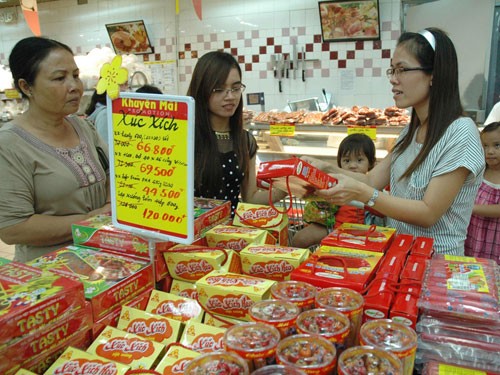 |
| (Photo: www.tinkinhte.com) |
(VOVworld) - The past two years have been considered a difficult time for the retail sector, especially the beginning months of this year, when local purchasing power has decreased sharply due to the global and domestic economic recession. Many retailers are struggling with inflation and bankruptcy risk. The Vietnam Retailers’ Association has been implementing many solutions to help businesses maintain and develop their production. VOV looks at the issue.
Statistics from the Ministry of Planning and Investment show that over the past 4 months more than 17,700 enterprises have been dissolved or have stopped operations. More than one third of them are wholesalers and retailers. Meanwhile, the consumer price index for April rose 0.05%, the lowest monthly increase in the past 2 years and the 9th consecutive month CPI has declined. Now that the inflation rate is under control, economists are worried that it’s due to a reduction of aggregate consumer demand. This could signal stagnation and a possible deflation, which have a serious impact on the retail industry. In the first quarter of the year, the volume of consumer goods was only 5% higher than in the same period last year. Doctor Dinh Thi My Loan, Vice President and Secretary of the Vietnam Retailers’ Association, says 'Vietnamese enterprises including domestic retailers are facing numerous difficulties. The biggest one is the decreased purchasing power as consumers tighten spending. Even though many commodities have been discounted, consumers seem to be waiting for further cuts'.
Nielsen Vietnam, a market research company, reports that last year the savings index in Vietnam rose to 70%, much higher than the Asian average of 59%. 63% of buyers are concerned about prices and do their best to shop as economically as possible. Huynh Thi Nga, a typical shoper, says 'Now I only buy things that I really need and carefully consider each purchase. I even put off my favorite items until the next shopping trip'.
Apart from policies to loosen money and reduce interest rates, the Vietnamese Government has promulgated a bailout package worth 1.4 billion USD. The State Bank of Vietnam has dropped the annual interest cap from 14% to 11%. Starting in May, a prime interest rate of 15% has been applied and commercial banks have been allowed to re-structure loans for businesses in temporary financial difficulties. Ms. Loan, Secretary of the Vietnam Retailers’ Association, urges enterprises to cut expenditures, re-organize management, share risks, optimize production assembly lines, and develop retail brands. Loan says 'Enterprises should re-define their position, as the Government’s support solution can’t suit all. Retailers should pay attention to trends among consumers. For example, in the current economic difficulties, mini marts and convenience shops are more popula'.
Vietnam now has more than 580 supermarkets and 120 shopping centers. Mini marts and convenience shops are more prevalent. And the traditional retail markets are changing in terms of both form and service quality.